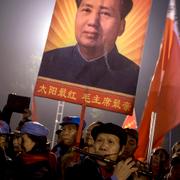bakgrund
Kulturrevolutionen
Wikipedia (en)
The Cultural Revolution, formally the Great Proletarian Cultural Revolution, was a sociopolitical movement that took place in the People's Republic of China from 1966 until 1976. Set into motion by Mao Zedong, then Chairman of the Communist Party of China, its stated goal was to preserve 'true' Communist ideology in the country by purging remnants of capitalist and traditional elements from Chinese society, and to re-impose Maoist thought as the dominant ideology within the Party. The Revolution marked the return of Mao Zedong to a position of power after the Great Leap Forward. The movement paralyzed China politically and significantly negatively affected the country's economy and society.
The Revolution was launched in May 1966, after Mao alleged that bourgeois elements had infiltrated the government and society at large, aiming to restore capitalism. He insisted that these "revisionists" be removed through violent class struggle. China's youth responded to Mao's appeal by forming Red Guard groups around the country. The movement spread into the military, urban workers, and the Communist Party leadership itself. It resulted in widespread factional struggles in all walks of life. In the top leadership, it led to a mass purge of senior officials, most notably Liu Shaoqi and Deng Xiaoping. During the same period Mao's personality cult grew to immense proportions.
Millions of people were persecuted in the violent struggles that ensued across the country, and suffered a wide range of abuses including public humiliation, arbitrary imprisonment, torture, sustained harassment, and seizure of property. A large segment of the population was forcibly displaced, most notably the transfer of urban youth to rural regions during the Down to the Countryside Movement. Historical relics and artifacts were destroyed. Cultural and religious sites were ransacked.
Mao officially declared the Cultural Revolution to have ended in 1969, but its active phase lasted until the death of the military leader Lin Biao in 1971. After Mao's death and the arrest of the Gang of Four in 1976, reformers led by Deng Xiaoping gradually began to dismantle the Maoist policies associated with the Cultural Revolution. In 1981, the Party declared that the Cultural Revolution was "responsible for the most severe setback and the heaviest losses suffered by the Party, the country, and the people since the founding of the People's Republic".

